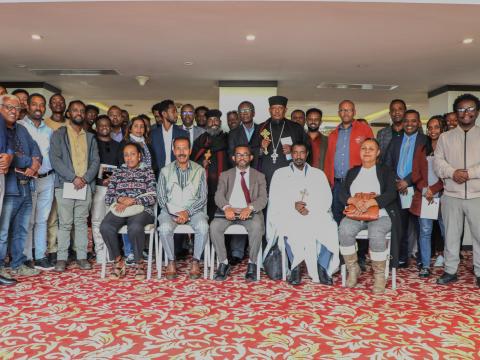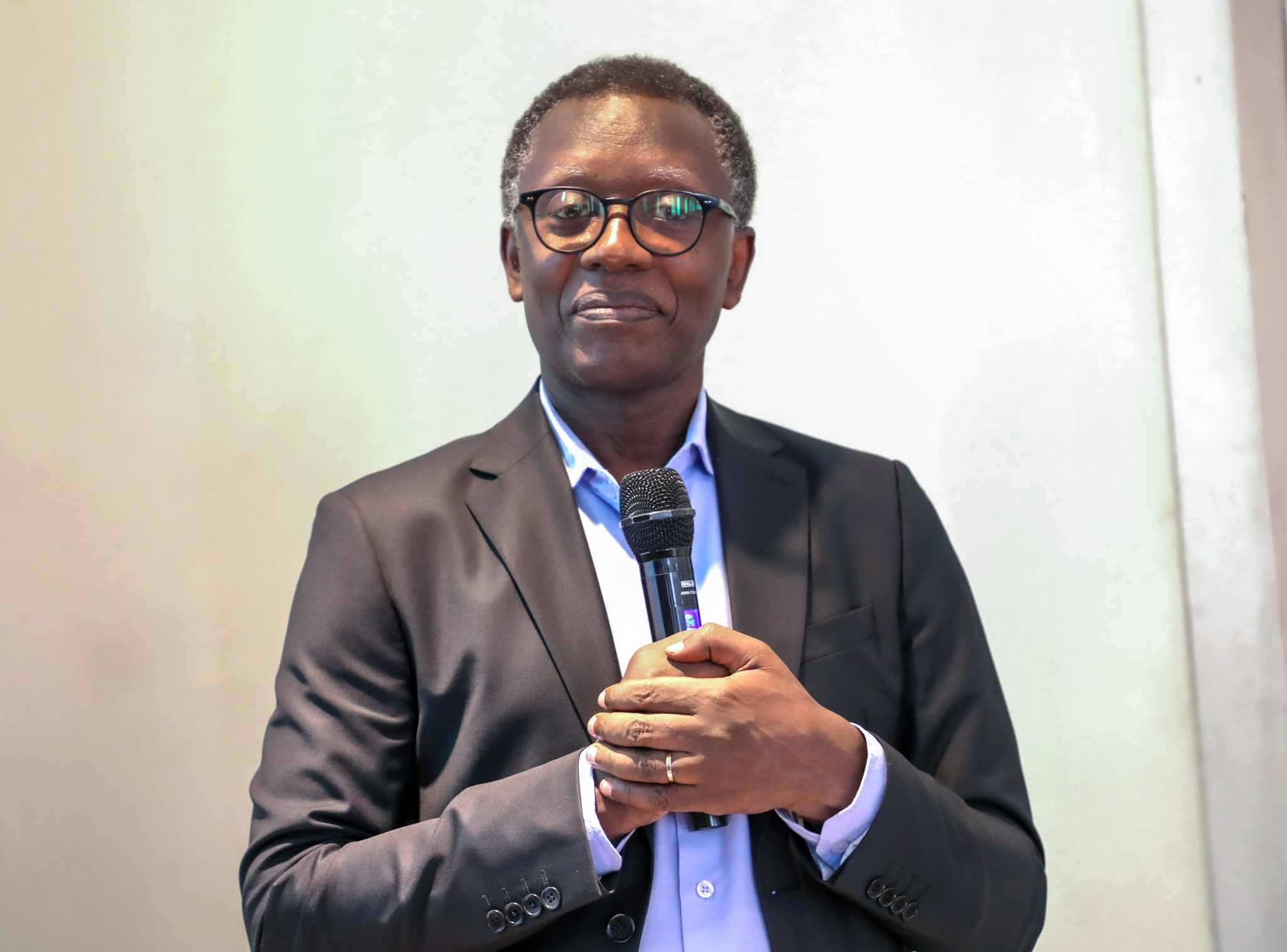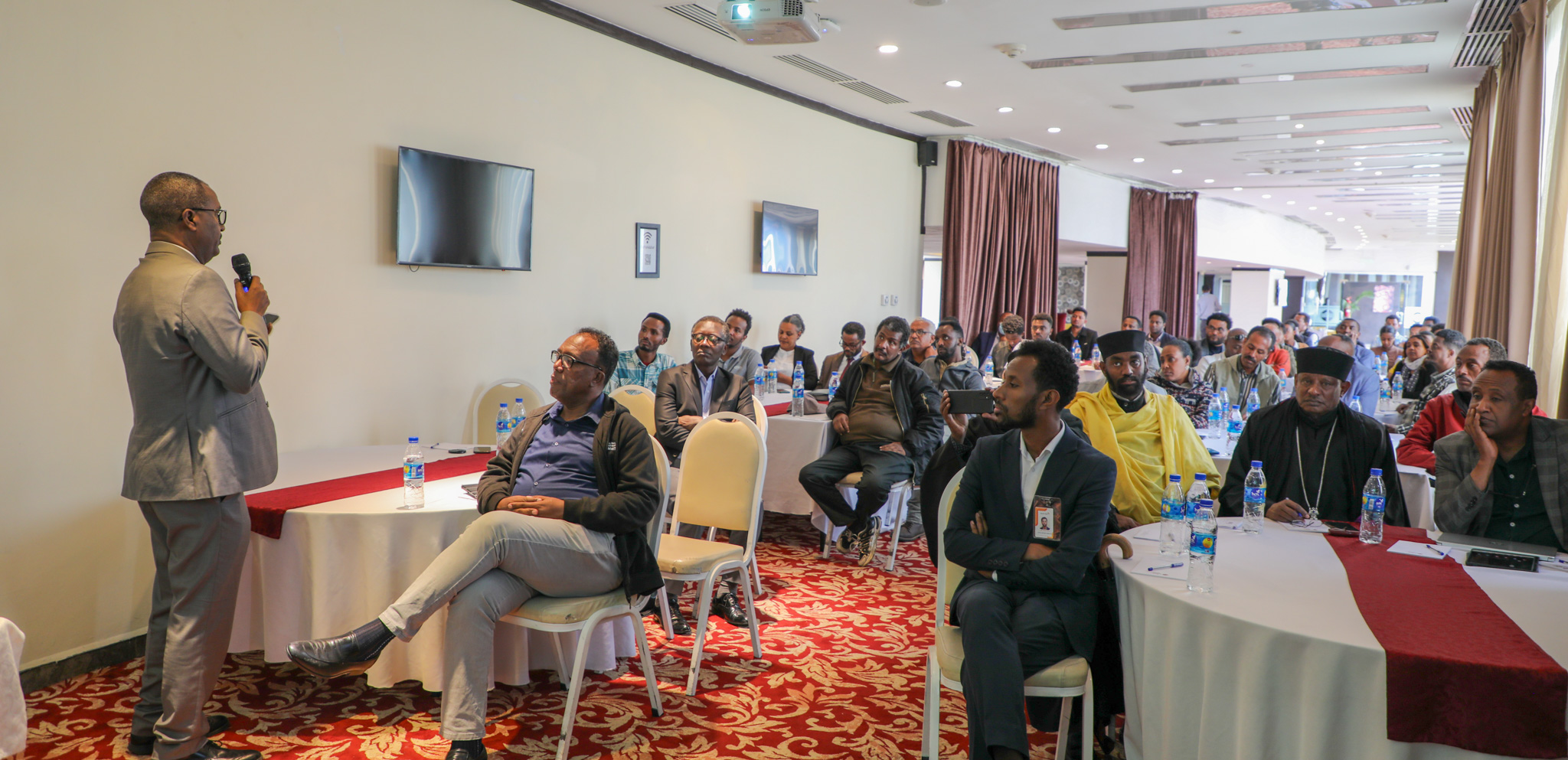World Vision Ethiopia holds a workshop for faith leaders on reconciliation and peacebuilding

World Vision Ethiopia (WVE) conducted a Reconciliation and Peacebuilding Workshop for leaders of faith-based organisations, in Addis Ababa. The workshop put together 60 delegates representing the Ethiopian Orthodox Church, Ethiopian Catholic Church, Ethiopian Council of Evangelical Churches, Inter-Religious Council of Ethiopia, and Ethiopian Bible Society, all of which focused on reconciliation and took an active part in the workshop.
The primary goal of the workshop was to learn from the Rwanda reconciliation process and to provide church leaders with conflict resolution skills and inspiration to take the initiative to begin reconciliation and restore peace in the minds of their respective church members, congregations, followers, and the general public.
 Reverend Dr. Antoine Rutayisire, a Rwandan peace and reconciliation champion and a world-class speaker on the topic of reconciliation, was the workshop facilitator. He underlines the importance of engaging everyone in a national reconciliation process. "When we think of reconciliation, we want everyone, including Christians, Muslims, and all other faith-based organisations living in the given country, to be part of the movement. This is because reconciliation is not intended for a single group. It includes all faith-based organisations. Everybody must be involved, embrace reconciliation, and do their share to heal the scars."
Reverend Dr. Antoine Rutayisire, a Rwandan peace and reconciliation champion and a world-class speaker on the topic of reconciliation, was the workshop facilitator. He underlines the importance of engaging everyone in a national reconciliation process. "When we think of reconciliation, we want everyone, including Christians, Muslims, and all other faith-based organisations living in the given country, to be part of the movement. This is because reconciliation is not intended for a single group. It includes all faith-based organisations. Everybody must be involved, embrace reconciliation, and do their share to heal the scars."
Dr. Rutayisire has served as a Commissioner on the National Unity and Reconciliation Commission, overseeing the implementation of Rwanda’s reconciliation policy since 1999. His knowledge and skill in reconciliation are practically tested and proven. He underlined that God has assigned three main roles to faith leaders. The first responsibility is a priestly role, which requires religious leaders to engage in and act as priests to their people and their nation as well as pray for their country. The second role of faith leaders is that of prophets, in which they gaze ahead, warn others of the dangers, provide guidance and advice, and educate people on how to live a decent life. The third duty is the pastoral, in which they address problems, educate people on how to pray, and strive to meet their needs.
Dr. Rutayisire, who himself was a survivor of genocide, advised the participants to be a voice for the voiceless, even if it meant facing harsh consequences. “Faith leaders must speak up when they find the government and its processes out of order. When you raise your voice, you may face harsh punishment, such as beatings, killings and death, but remember that you are paying the price for a noble cause. When we have critical difficulties that require the attention of government leaders, we must assess the community's challenges, meet top government officials in person and demonstrate the community's challenges in a loving manner rather than using violence. Faith leaders do not respond to violence. Those who reacted violently during the Rwanda genocide were killed.”
One of the most hotly debated topics was religious leaders' failure and the consequences. Conflict has a root cause and it passes through different stages before it erupts into violence. Before it is too late, faith leaders must investigate the sources of conflict in their communities. Faith leaders must listen to the voices of their communities and teach people how to heal from animosities before engaging in confrontation. Raising a prophetic voice as the fight begins does not result in a solution. He says, “Our failure does not occur when disagreements arise. They have occurred in the past because we have failed to assess our communities and assist them in healing from ethnic, racial, and regional animosities before it is too late. We do not raise our prophetic voice. When the conflict explodes, it is too late to be of great use. Listen to your people, raise their voices, and solve their problems before it is too late.”
Dr. Rutayisire called on Ethiopia's religious leaders to embody their forefathers’ spirit of togetherness, which kept Ethiopia unified against colonial aggressors. "Ethiopia has long been Africa's pride. It is the only African country that is not colonised and enjoys freedom while other African countries endure the consequences of colonialism. Ethiopian spiritual leaders could have utilised their forebears' spirit of togetherness to redirect the cloud of strife looming in the sky of Ethiopia, rather than allowing the situation to occur and generate problems for the people," he remarked.
 The workshop also addressed the responsibilities of religious leaders before, during, and after the conflict. Faith leaders are considered to play roles in all cycles of conflict. Before any dispute occurs, faith leaders must act prophetically and assist the people in healing. During the conflict, religious leaders must serve as intermediaries and pray for the violence to subside. Reconciliation begins when weapons are silenced. Faith leaders must rediscover their identity and mission, and make it acceptable to all people. "Faith leaders are messengers from God. You should pray for your people and speak prophetically. You also need to listen and take care of the needy people, as conflict leaves destruction behind. You don’t have to do things as usual, and you need to help them in a way that heals their wounds.”
The workshop also addressed the responsibilities of religious leaders before, during, and after the conflict. Faith leaders are considered to play roles in all cycles of conflict. Before any dispute occurs, faith leaders must act prophetically and assist the people in healing. During the conflict, religious leaders must serve as intermediaries and pray for the violence to subside. Reconciliation begins when weapons are silenced. Faith leaders must rediscover their identity and mission, and make it acceptable to all people. "Faith leaders are messengers from God. You should pray for your people and speak prophetically. You also need to listen and take care of the needy people, as conflict leaves destruction behind. You don’t have to do things as usual, and you need to help them in a way that heals their wounds.”
Melake Selamawi Harege, from the Orthodox Church Bible Society representative, was among the workshop attendees. “I believe we are in a frightening circumstance. We have no certainty about what the future holds. We hear and witness deaths, tragedies, and violence. However, this session sowed the seeds of optimism in my life. I believe that we have a ray of optimism. We may work together to encourage people to reconcile. I may now share my idea with others and take action."
Dr. Yabtsega Amlaku works with the Education for Africa Mission and Development initiative, which promotes peacebuilding. "This workshop has given me a more optimistic outlook on the reconciliation process," he elaborates, “I had not before considered going to the community and assessing their problems. This program has taught me to engage with our communities, listen to their concerns, bring them to the government, and identify solutions that promote peace and reconciliation. I believe we have an opportunity to reconcile and bring peace to our people.”
Paster Bitew Geda, is a Dil Birhan Evangelical Church leader. He says, "I have the burden of reconciliation. Wherever I deliver the word of God, I generally preach to people to reconcile, but not in a structured fashion. I believe that God has spoken to me via this course. In the future, I plan to increase my structured reconciliation efforts and give my fair share. I'd also want to invite World Vision Ethiopia and the Ethiopian Bible Society to collaborate to boost peacebuilding and reconciliation efforts across the nation."
World Vision Ethiopia is engaging in different peacebuilding interventions in different parts of the country. The Gedio-Guji successful reconciliation effort, the Amaro Guji humanitarian, peacebuilding and development project, the peacebuilding project in East and West Wolega, and Kamahsi Zones, and an ongoing peacebuilding endeavour are worth mentioning. World Vision will continue to do its level best to create a lasting peace for the children of Ethiopia.
By Aklilu Kassaye, Field Communication Manager, World Vision Ethiopia